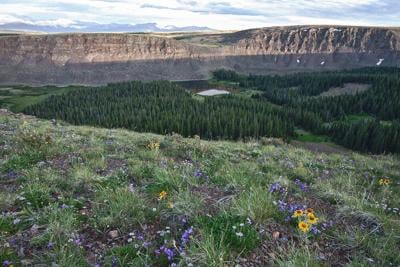Those who take the Cannibal Plateau Trail near Lake City are led to the site of one of Colorado’s most disturbing incidents.
In 1873, a group of men left the camp of Ute Chief Ouray (now Montrose) during winter to reach the Breckenridge area in hopes of striking gold. However, a harsh winter storm caught the group of men in the area that is now Lake City, a mountain town in Colorado said to be the most remote town in the lower 48 states. Alferd Packard came back in spring of 1874 without the other five men.
Packer was brought to Denver and questioned by authorities in 1883 after he was seen with items belonging to the missing men, including a knife, rifle, and money. Packer claimed he acted in self-defense when one of the men became violent towards the others.
Evidence was found by researchers of the act of cannibalism including the discovery of bones with scrapings on them. The partially decomposed bodies of the men were found after the snowpack melted. Packer claimed he ate the meat of the bodies to survive the winter.
A memorial site is established at the top of the Cannibal Plateau, overlooking Lake City, where the men’s remains were found. Hikers can visit the site along the 5.1-mile trail up the Cannibal Plateau.
Mountains line the horizon from the view at the top. The trail dead ends and hikers must descend back down. Mountain bikers, equestrians, and motorized vehicles are also permitted to use the trail to the Colorado Cannibal memorial site.
A network of trails exists on the plateau, giving adventurers many opportunities to branch off and explore the area above timberline.
Packer faced trial in Lake City where he was found guilty of murder by the jury and Judge Melville B. Gerry. Even after appealing his conviction to the Colorado Supreme Court, the verdict was reversed, and Packer was guilty of manslaughter and sentenced to 40 years in the state penitentiary.
He served 17 years of his sentence and was granted parole by Governor Charles S. Thomas in 1901. Packer moved to Littleton, where he died in 1907 of natural causes. He was held a military funeral to honor his service in the Civil War and buried in Little Cemetery.








(0) comments
Welcome to the discussion.
Log In
Keep it Clean. Please avoid obscene, vulgar, lewd, racist or sexually-oriented language.
PLEASE TURN OFF YOUR CAPS LOCK.
Don't Threaten. Threats of harming another person will not be tolerated.
Be Truthful. Don't knowingly lie about anyone or anything.
Be Nice. No racism, sexism or any sort of -ism that is degrading to another person.
Be Proactive. Use the 'Report' link on each comment to let us know of abusive posts.
Share with Us. We'd love to hear eyewitness accounts, the history behind an article.